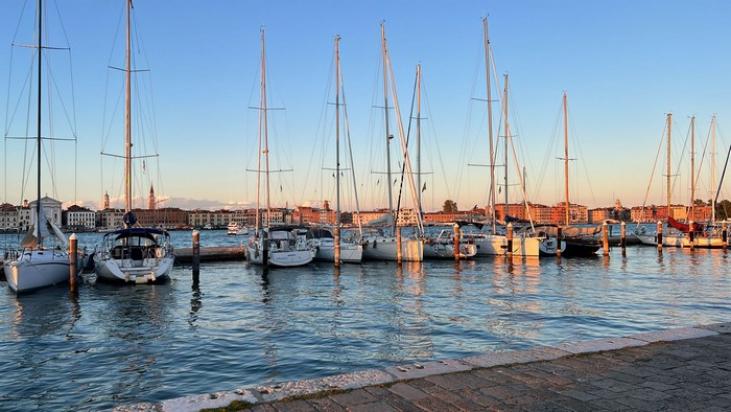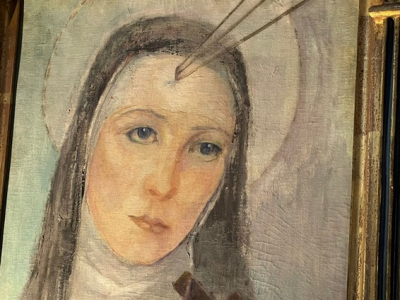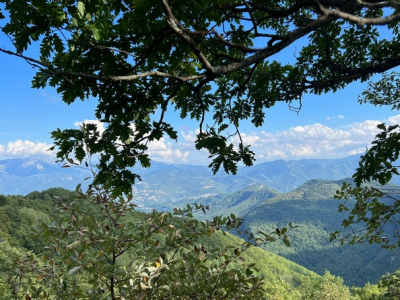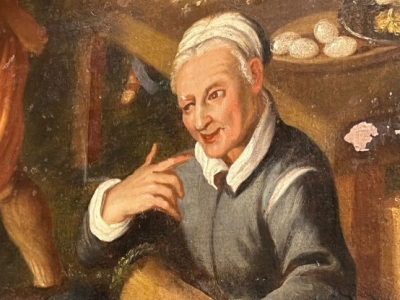stdClass Object
(
[id] => 19367
[title] => The most beautiful daughter of gratuity
[alias] => the-most-beautiful-daughter-of-gratuity
[introtext] => Roots of the future/11 - Two wrong worlds: the land of toys and the island of busy bees.
By Luigino Bruni
Published in Avvenire 13/11/2022
"The child is an artist, he is in love with life. And don’t you dare to whisper words to lovers against the object of their love, don’t you dare to show the least beautiful and most cruel aspects."
Vincenzina Battistelli, Modern children's literature (La moderna letteratura per l’infanzia), 1925
Our reflection on Pinocchio, and this series of articles, have now come to an end. With a revelation that a village is not enough to raise a child: it takes the whole universe. And with a great speech on kids’ work and on reciprocity.
One of the many unique gifts of infancy and childhood is an ability to relate to others much greater than our own. Kids, girls and boys are able to converse with insects, birds and trees. It is as if the bundle in which they arrive on earth there also contained a different and deeper gaze and hearing enabling them to see things and understand languages, an ability that then vanish once they grow up. Perhaps they are the sounds and words of Adam before Cain, voices and images of that Promised Land that we glimpsed as children, which we then forgot, but which we still dream of some nights - and we really love the dream. Here lies the root of true reciprocity between adults and children. They have something less than we do, but they also have something more, which if we manage to recognize it protects us from a wrongful form of paternalism, creating one of the most beautiful spectacles under the sun: genuine fraternity between adults and children. Francis of Assisi was able to feel this fraternity with all living creatures because, out of an endless love for the Gospel, he had managed by grace to become a child again. Francesco's friends love Pinocchio very much, because they see something of the "jester of God" in him, of that freedom that only children (natural or evangelical) possess.
[fulltext] =>
Pinocchio talks to blackbirds and fireflies, crickets and fish. Among his decisive experiences of reciprocity are those with the pigeon that carries him on its back for a thousand kilometres, or with the tuna fish that saves him in the sea. The mastiff dog, Alidoro, rescued by Pinocchio when he was in danger of drowning, reveals a precious secret to him: «In this world, what is done is also returned». It is the fundamental golden law of life, reciprocity, and it is revealed to him and fully experienced by a dog: in fact, when Pinocchio is about to be fried in the green angler’s pan (chapter XXVIII), Alidoro is the one who «baits him» and then saves him. Pinocchio tells us that a village is not enough to raise a child: it takes the whole universe.
The society in which Pinocchio was born was very different from ours. Families and the Church raised children and young people within the confines of a very precise idea of the world. The educational rules were clear and shared by everyone, and so Collodi could be transgressive simply by taking Pinocchio’s side, Pinocchio who was disobedient and ran away from home. When we look at boys and girls today, however, we immediately realize that their poverty consists in the impossibility of disobeying due to the lack of shared and clear rules to challenge. This is the foremost experience of many teachers. Nevertheless, even in this case, if we manage to move beyond this first dimension, we could discover something different.
After having tried, in vain, to swim to Geppetto in the middle of the sea, Pinocchio swims to the Island of Busy Bees (Chapter XXIV): «The streets were swarming with people running hither and thither about their business: they all worked, everyone had something to do. Not a single idler or a vagabond could be found, not even if you looked for them with the help of a small torch». It is not an industrial country: it is an industrious country. Hence, not an image of the birth of capitalism, but that of a frenetic society without any spare time, of a country without idleness. The use of the bee metaphor was very common to indicate a good society. "The Fable of the Bees" by the French moralist Fénelon described a world where «idleness and laziness have been banned», and «merit is the only path that leads to the top positions» (Les Abeilles, late seventeenth century). Reading this chapter, Collodi-Pinocchio's sympathy for this society of only work and no free time does not transpire - perhaps he had more sympathy for Mandeville's "The tale of the bees" and his praise of vice. However, Collodi's criticism was not aimed at adult society: it was the society of children that was closest to his heart.
Once he arrives on the island, Pinocchio exclaims: «I understand - this country is not made for me!». Actually, it is a place very similar to the Land of Toys: in the Land of Toys there is no school ("the fall holidays begin on January 1st and end on the last day of December: chapter XXX), only games; in that of the industrious bees there is no spare time, only work. Two worlds that are wrong in different ways. It is not true that kids do not want to work. They just want to “work”, once in a while and in their own way, in their own world.
«What do you want to be when you grow up?» – asked my teacher friend, Matteo, to a fifth grade student. «To rest», she replied. Our kids are overloaded with "work": school, homework, gym, music, dance classes, swimming pool, catechism... A time management that leaves very little room for sweet idleness, which, as children, is instead essential to them. It is in that free time, made up of long hours spent playing, talking to a toy or a cat, (a time that now must also be freed from smartphones), that the imagination develops, and creativity and the desire for different things grow. It is the land not on sale, where children can and must be allowed to graze wild. I was raised with mathematics and poetry, but I learned some of the most important things in life while running around endlessly across the meadows, during long summers spent making dams and diving in the stream, building tree huts. Long hours without the presence of any fathers, mothers, teachers, or educators - and thus I grew up in my beautiful "land of toys". We adults can live (badly) even without the Shabbat: kids however cannot, they would die in their souls without a different kind of seventh day.
Pinocchio is hungry (he is always hungry): «There were only two ways left for him to be able to feed himself: either ask for some work, or beg for a penny or a morsel of bread». But «he was ashamed to ask for alms», because Geppetto had taught him that «only the elderly and the infirm have the right to ask for alms... All the others have an obligation to work». It is all too clear that this world is not the one Collodi loved - one must be very careful to identify where an author's thoughts can to be found: it almost never lies in the explicit morals of their characters. In fact, in the newspaper Il Fanfulla, Collodi wrote: «Begging in public is strictly prohibited In Florence. This is a good thing. No one asks for alms in a civilized country. In highly civilized countries, not only does no one ask for it, it is simply not done. And it is precisely thanks to this very strict prohibition that you will find a beggar on every street corner in Florence» (1874).
The puppet meets a first passer-by: «A man all sweaty and out of breath, who was pulling two carts loaded with coal, all by himself with great difficulty. Pinocchio went up to him and, lowering his eyes in shame, said to him in a low voice: Would you be kind enough to give me a penny, because I feel like I am dying of hunger? – Not only a penny, replied the charcoal burner, I'll give you four, provided that you help me haul these two carts of coal home. – I am surprised! - replied the puppet almost offended – for your information, I have never been a mule». Pinocchio had asked, in a low voice, for "charity", and the man offered him a contract instead. Pinocchio does not accept. Then he meets a bricklayer: «Come with me to help me bring the mortar, and instead of a penny, I'll give you five». Here the coins become five, but Pinocchio does not accept the two men's contracts, and starts begging instead. Not even now does he follow the recommendations of his father and of the world of grown-ups, but choses transgression: «In less than half an hour another twenty people passed by, and Pinocchio asked all of them for a few coins, but they all answered him: - Aren't you ashamed…? Learn how to make your own living!».
Pinocchio prefers alms to work; he prefers feeling ashamed to having a contract. Children's right to food and possessions does not arise from a do ut des relationship. No, our duty to feed them arises only and solely from their condition as children. Their bread or living does not have to be deserved. Pinocchio’s and the children’s rejection of the contract shows us a wider human horizon than that of merely merit and trade – we are worth more, much more.
And in this context, children are very similar to God, and God is very similar to them.
At the end of his stay on the island, Pinocchio actually ends up doing a job: «Finally a good woman passed by, carrying two jugs of water. – Would it be all right with you, good lady, if I took a sip of water from your jug? » asked Pinocchio, who was burning up with thirst. «Drink up, my boy!» The dialogue with this woman begins with a gift. A woman, who later turns out to be his fairy godmother, answers Pinocchio's first request for a glass of water with an unconditional "yes" and does not ask him to earn the water, she simply gives it to him.
The only good reciprocity when it comes to kids is the one that is activated with a gift, the beautiful daughter of gratuitousness. Pinocchio continues: «I got rid of my thirst! If only could get rid of my hunger…! - If you help me carry one of these jugs of water home, I'll give you a nice piece of bread. - Pinocchio looked at the pitcher and answered neither yes nor no. Here, the woman's speech resembles the previous dialogues with the men. Again, Pinocchio does not accept. However, here is the turning point: «And together with the bread I will give you a nice plate of cauliflower seasoned with oil and vinegar... And after the cauliflower I will give you a nice bonbon filled with rosolio liquor». That woman had surpassed the exchange of equivalents. The reciprocity of children arises from an asymmetrical surplus. The contractual exchanges that adults engage in are too little for them: «Pinocchio was no longer able to resist the temptation of this last delicacy». The different kind of reciprocity of kids begins with a gift and continues with a surplus. This is how, down the line, they will learn well the art of the different and necessary reciprocity of contracts.
Collodi's masterpiece concludes the "Roots of the future" series and our dialogue with some great authors - I hope to be able to resume them sometime in the future. As of next Sunday, I will return to the biblical comments with the Book of Esther. Every time I reach the end of a journey in the "Avvenire", my first thanks go to its Editor, main companion and protagonist of all my new journeys, each time taking place within the wounds and joys of our time – a difficult and daunting, but always wonderful task because we only have time to love.
[checked_out] => 0
[checked_out_time] => 0000-00-00 00:00:00
[catid] => 1165
[created] => 2022-11-13 00:46:31
[created_by] => 4501
[created_by_alias] => Luigino Bruni
[state] => 1
[modified] => 2022-11-25 16:18:17
[modified_by] => 64
[modified_by_name] => Antonella Ferrucci
[publish_up] => 2022-11-13 00:52:59
[publish_down] => 0000-00-00 00:00:00
[images] => {"image_intro":"","float_intro":"","image_intro_alt":"","image_intro_caption":"","image_fulltext":"","float_fulltext":"","image_fulltext_alt":"","image_fulltext_caption":""}
[urls] => {"urla":false,"urlatext":"","targeta":"","urlb":false,"urlbtext":"","targetb":"","urlc":false,"urlctext":"","targetc":""}
[attribs] => {"article_layout":"","show_title":"","link_titles":"","show_tags":"","show_intro":"","info_block_position":"","info_block_show_title":"","show_category":"","link_category":"","show_parent_category":"","link_parent_category":"","show_associations":"","show_author":"","link_author":"","show_create_date":"","show_modify_date":"","show_publish_date":"","show_item_navigation":"","show_icons":"","show_print_icon":"","show_email_icon":"","show_vote":"","show_hits":"","show_noauth":"","urls_position":"","alternative_readmore":"","article_page_title":"","show_publishing_options":"","show_article_options":"","show_urls_images_backend":"","show_urls_images_frontend":"","helix_ultimate_image":"images\/2022\/11\/25\/221113-radici-di-futuro_large.png","helix_ultimate_image_alt_txt":"","spfeatured_image":"images\/2022\/11\/13\/221113-radici-di-futuro.png","helix_ultimate_article_format":"standard","helix_ultimate_audio":"","helix_ultimate_gallery":"","helix_ultimate_video":"","video":""}
[metadata] => {"robots":"","author":"","rights":"","xreference":""}
[metakey] =>
[metadesc] =>
[access] => 1
[hits] => 1485
[xreference] =>
[featured] => 1
[language] => en-GB
[on_img_default] =>
[readmore] => 9692
[ordering] => 0
[category_title] => EN - Roots of the future
[category_route] => economia-civile/it-radici-di-futuro
[category_access] => 1
[category_alias] => en-roots-of-the-future
[published] => 1
[parents_published] => 1
[lft] => 90
[author] => Luigino Bruni
[author_email] => lourdes.hercules.91@gmail.com
[parent_title] => Economia Civile
[parent_id] => 1024
[parent_route] => economia-civile
[parent_alias] => economia-civile
[rating] => 0
[rating_count] => 0
[alternative_readmore] =>
[layout] =>
[params] => Joomla\Registry\Registry Object
(
[data:protected] => stdClass Object
(
[article_layout] => _:default
[show_title] => 1
[link_titles] => 1
[show_intro] => 1
[info_block_position] => 0
[info_block_show_title] => 1
[show_category] => 1
[link_category] => 1
[show_parent_category] => 1
[link_parent_category] => 1
[show_associations] => 0
[flags] => 1
[show_author] => 0
[link_author] => 0
[show_create_date] => 1
[show_modify_date] => 0
[show_publish_date] => 1
[show_item_navigation] => 1
[show_vote] => 0
[show_readmore] => 0
[show_readmore_title] => 0
[readmore_limit] => 100
[show_tags] => 1
[show_icons] => 1
[show_print_icon] => 1
[show_email_icon] => 1
[show_hits] => 0
[record_hits] => 1
[show_noauth] => 0
[urls_position] => 1
[captcha] =>
[show_publishing_options] => 1
[show_article_options] => 1
[save_history] => 1
[history_limit] => 10
[show_urls_images_frontend] => 0
[show_urls_images_backend] => 1
[targeta] => 0
[targetb] => 0
[targetc] => 0
[float_intro] => left
[float_fulltext] => left
[category_layout] => _:blog
[show_category_heading_title_text] => 0
[show_category_title] => 0
[show_description] => 0
[show_description_image] => 0
[maxLevel] => 0
[show_empty_categories] => 0
[show_no_articles] => 0
[show_subcat_desc] => 0
[show_cat_num_articles] => 0
[show_cat_tags] => 1
[show_base_description] => 1
[maxLevelcat] => -1
[show_empty_categories_cat] => 0
[show_subcat_desc_cat] => 0
[show_cat_num_articles_cat] => 0
[num_leading_articles] => 0
[num_intro_articles] => 14
[num_columns] => 2
[num_links] => 0
[multi_column_order] => 1
[show_subcategory_content] => -1
[show_pagination_limit] => 1
[filter_field] => hide
[show_headings] => 1
[list_show_date] => 0
[date_format] =>
[list_show_hits] => 1
[list_show_author] => 1
[list_show_votes] => 0
[list_show_ratings] => 0
[orderby_pri] => none
[orderby_sec] => rdate
[order_date] => published
[show_pagination] => 2
[show_pagination_results] => 1
[show_featured] => show
[show_feed_link] => 1
[feed_summary] => 0
[feed_show_readmore] => 0
[sef_advanced] => 1
[sef_ids] => 1
[custom_fields_enable] => 1
[show_page_heading] => 0
[layout_type] => blog
[menu_text] => 1
[menu_show] => 1
[secure] => 0
[helixultimatemenulayout] => {"width":600,"menualign":"right","megamenu":0,"showtitle":1,"faicon":"","customclass":"","dropdown":"right","badge":"","badge_position":"","badge_bg_color":"","badge_text_color":"","layout":[]}
[helixultimate_enable_page_title] => 1
[helixultimate_page_title_alt] => Oikonomia
[helixultimate_page_subtitle] => Roots of the future
[helixultimate_page_title_heading] => h2
[page_title] => Roots of the future
[page_description] =>
[page_rights] =>
[robots] =>
[access-view] => 1
)
[initialized:protected] => 1
[separator] => .
)
[displayDate] => 2022-11-13 00:46:31
[tags] => Joomla\CMS\Helper\TagsHelper Object
(
[tagsChanged:protected] =>
[replaceTags:protected] =>
[typeAlias] =>
[itemTags] => Array
(
[0] => stdClass Object
(
[tag_id] => 18
[id] => 18
[parent_id] => 1
[lft] => 33
[rgt] => 34
[level] => 1
[path] => luigino-bruni
[title] => Luigino Bruni
[alias] => luigino-bruni
[note] =>
[description] =>
[published] => 1
[checked_out] => 0
[checked_out_time] => 0000-00-00 00:00:00
[access] => 1
[params] => {"tag_layout":"","tag_link_class":"label label-info"}
[metadesc] =>
[metakey] =>
[metadata] => {"author":"","robots":""}
[created_user_id] => 611
[created_time] => 2015-11-14 21:22:09
[created_by_alias] =>
[modified_user_id] => 609
[modified_time] => 2020-08-01 10:35:46
[images] => {"image_intro":"","float_intro":"","image_intro_alt":"","image_intro_caption":"","image_fulltext":"","float_fulltext":"","image_fulltext_alt":"","image_fulltext_caption":""}
[urls] => {}
[hits] => 128341
[language] => *
[version] => 1
[publish_up] => 2015-11-14 20:22:09
[publish_down] => 2015-11-14 20:22:09
)
[1] => stdClass Object
(
[tag_id] => 171
[id] => 171
[parent_id] => 1
[lft] => 339
[rgt] => 340
[level] => 1
[path] => radici-di-futuro
[title] => Radici di futuro
[alias] => radici-di-futuro
[note] =>
[description] =>
[published] => 1
[checked_out] => 0
[checked_out_time] => 0000-00-00 00:00:00
[access] => 1
[params] => {"tag_layout":"","tag_link_class":"label label-info"}
[metadesc] =>
[metakey] =>
[metadata] => {"author":"","robots":""}
[created_user_id] => 64
[created_time] => 2022-09-03 14:22:58
[created_by_alias] =>
[modified_user_id] => 64
[modified_time] => 2022-09-03 20:39:25
[images] => {"image_intro":"","float_intro":"","image_intro_alt":"","image_intro_caption":"","image_fulltext":"","float_fulltext":"","image_fulltext_alt":"","image_fulltext_caption":""}
[urls] => {}
[hits] => 12825
[language] => *
[version] => 1
[publish_up] => 2022-09-03 14:22:58
[publish_down] => 2022-09-03 14:22:58
)
)
)
[slug] => 19367:the-most-beautiful-daughter-of-gratuity
[parent_slug] => 1024:economia-civile
[catslug] => 1165:en-roots-of-the-future
[event] => stdClass Object
(
[afterDisplayTitle] =>
[beforeDisplayContent] =>
[afterDisplayContent] =>
)
[text] => Roots of the future/11 - Two wrong worlds: the land of toys and the island of busy bees.
By Luigino Bruni
Published in Avvenire 13/11/2022
"The child is an artist, he is in love with life. And don’t you dare to whisper words to lovers against the object of their love, don’t you dare to show the least beautiful and most cruel aspects."
Vincenzina Battistelli, Modern children's literature (La moderna letteratura per l’infanzia), 1925
Our reflection on Pinocchio, and this series of articles, have now come to an end. With a revelation that a village is not enough to raise a child: it takes the whole universe. And with a great speech on kids’ work and on reciprocity.
One of the many unique gifts of infancy and childhood is an ability to relate to others much greater than our own. Kids, girls and boys are able to converse with insects, birds and trees. It is as if the bundle in which they arrive on earth there also contained a different and deeper gaze and hearing enabling them to see things and understand languages, an ability that then vanish once they grow up. Perhaps they are the sounds and words of Adam before Cain, voices and images of that Promised Land that we glimpsed as children, which we then forgot, but which we still dream of some nights - and we really love the dream. Here lies the root of true reciprocity between adults and children. They have something less than we do, but they also have something more, which if we manage to recognize it protects us from a wrongful form of paternalism, creating one of the most beautiful spectacles under the sun: genuine fraternity between adults and children. Francis of Assisi was able to feel this fraternity with all living creatures because, out of an endless love for the Gospel, he had managed by grace to become a child again. Francesco's friends love Pinocchio very much, because they see something of the "jester of God" in him, of that freedom that only children (natural or evangelical) possess.
[jcfields] => Array
(
)
[type] => intro
[oddeven] => item-odd
)
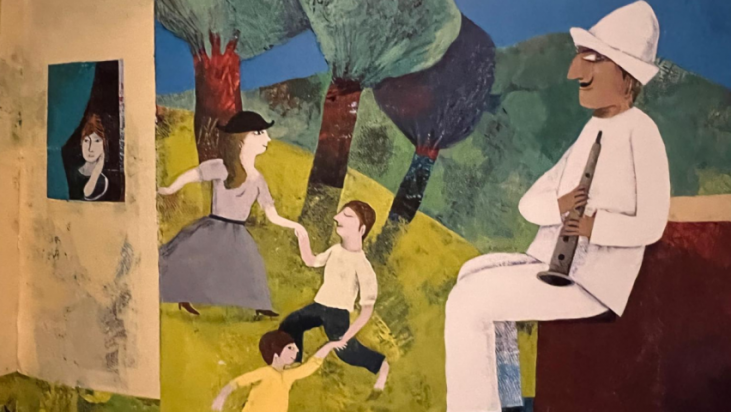






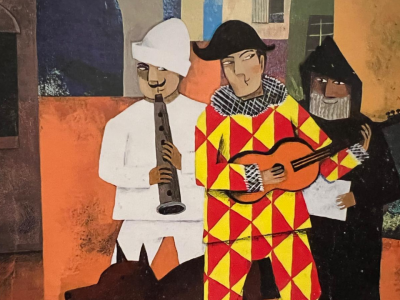
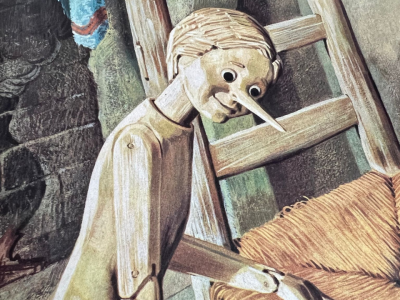
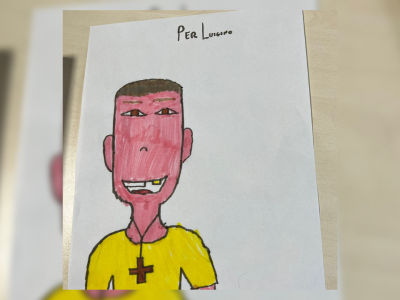
_large_medium.png)
